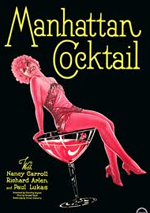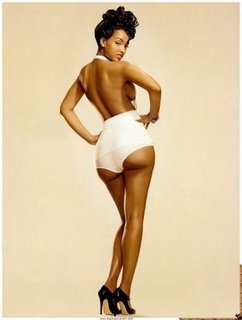Long, long ago in a gender galaxy far, far away…
…I was butch!
I know what you’re thinking: how could your favorite ravishing femme queer theorist–who is typing these words with perfectly manicured red nails–have ever been butch? But it’s really true, my lovelies, I swear. I had Hilary Swank’s haircut in Boys Don’t Cry, stomped around in big Timberland boots, got my clothes from the men’s department, and my only grooming products were shampoo, soap and chapstick. In the community that I came out into, to be a lesbian meant that you were butch, andro, or flannel, period. I actually had no idea that other kinds of lesbian genders existed!
I’m writing this piece in response to Hussy Red’s terrific post “The Femme Archive” on The Femme Guide, which asks all of us to share our own stories about how we’ve come to our identities as femmes. So, I’ve been asking myself: Who and what inspired, affirmed and taught me as I traveled the long and winding road to femme? What made me feel authorized to express my own queer femininity? Here are my answers, in no particular order:
1. Femme Icons. These are the brave, beautiful women who inspired me and educated me about femme, even if I never knew them. For me, Joan Nestle, Susie Bright, and Amber Hollibaugh are at the top of the list; their brilliance, political activism, magnetic eroticism and kick-ass femme attitudes made me think, that’s what I want to be when I grow up! Femme icons from earlier eras have also been a big source of inspiration for me. If you’ve read my post on Greta Garbo, you know that I love old Hollywood glamour and the beautiful and talented lesbian and bisexual women who serve, for me, as icons of queer femininity. (For the scoop about Garbo, Tallaluh Bankhead, Mercedes de Acosta, Marlene Dietrich and more, check out Diana McLellan’s The Girls: Sappho Goes to Hollywood!) But Femme icons are also people we see everyday. For me, getting to know and work with smart and successful femme/feminine lesbians who were my teachers and mentors was an incredible blessing. By modeling their own versions of femme in their lives and work (from lipstick lesbian to campy, queer femme identities), they introduced me to ways of inhabiting lesbian gender that I had never imagined possible.
2. Butch/femme and lesbian history. Learning about the history of butch/femme in the 40s, 50s and 60s was incredibly important to me. Reading Leslie Feinberg’s Stone Butch Blues–which was itself a life-changing experience–motivated me to learn more about butch/femme working-class communities in postwar America. I was so inspired and impressed by how brave these women were, and how hard they had fought to carve out spaces for public, visible lesbian communities under extremely oppressive social conditions. In fact, the main reason I began to identify as a femme (as opposed to lipstick lesbian, for example) is precisely because I wanted to connect with that past. This is still true for me today; calling myself a femme is one way I strive to honor the struggles, sacrifices, and hard-won victories of butches and femmes and carry them forward into the present. To learn more about butch/femme communities in the 50s, I highly recommend Elizabeth Lapovsky Kennedy and Madeline Davis’ wonderfully readable oral history, Boots of Leather, Slippers of Gold.
3. Gay men. What can I say? I’m a huge fan!! Meet me at the intersection of Oscar Wilde and John Waters. Gay men helped me to embrace my identity as a femme because they offered me a space to celebrate femininity with joy and a sense of playfulness, which felt worlds removed from the shaming, suspicion or just perplexed confusion that I felt from some lesbians and feminists. In the gay world, I wasn’t just “tolerated” for being femme, I was loved and respected. Gay male friends who appreciated beauty, fashion and glamour also taught me a thing or two about queer aesthetics and camp, both of which changed the way I look at the world. Most importantly, they inspired me to approach gender and sexuality with a sense of adventure and frivolity that has shaped how I “do” femme.
4. Facing My Own Pain and Gender Oppression. It wasn’t until a few years ago, when I had an epiphany sitting in the audience at a GenderPAC conference, that I realized how hurt I’ve been from the years of being shunned in lesbian/feminist bookstores (for being too femme) or being marginalized in the straight world (for being too queer). At GenderPAC, Riki Wilchins was talking about the oppression faced by femmes, which often isn’t recognized because we do not (typically) transgress gender norms. Suddenly, tears filled my eyes and I was overwhelmed by a powerful emotional reaction I had never anticipated. What was going on?
I went to the conference because I’m an ally of trans and genderqueer people, and I wanted to participate in the important education and advocacy work that GenderPAC does. But as I was listening to Riki speak, I realized that I was exactly where I needed to be–not for others, but for me. Coming to terms with my own gender oppression not just as a woman but also as a femme has enabled me to work towards healing the pain I didn’t even realize I was carrying inside me. It has helped me to politicize my own experience as a femme in ways I hadn’t previously, because now I understand and appreciate the depth of that experience not only with my head, but also with my heart.
By Way of a Conclusion. All of this doesn’t quite tell you how I travelled from the andro butch of my younger years to the capitivating vision of femme-ininity I am now, but these snapshots of my journey are at the core of what has made me a femme. I hope you’ll go to The Femme Guide and write about what made/makes you a femme, because I can’t wait to read your stories! Regardless of how we identify or the differences that shape our lives, we all have *so much* to learn from each other.
Filed under: Femme Icons, Lesbian & Queer Genders, Queer Femininity | Tagged: Amber Hollibaugh, Beauty, butch, butch/femme, camp, coming out, femme, gender galaxy, gender oppression, GenderPAC, glamour, Greta Garbo, Joan Nestle, John Waters, Leslie Feinberg, Marlene Dietrich, Mercedes de Acosta, Oscar Wilde, queer aesthetics, queer femininity, Riki Wilchins, Stone Butch Blues, Susie Bright, Tallulah Bankhead, The Femme Archive, The Femme Guide | 10 Comments »






